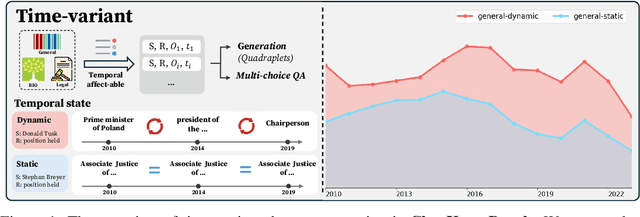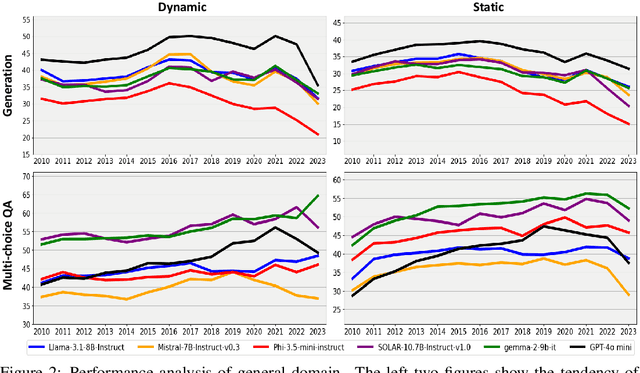Chanwoong Yoon
Outlier-Safe Pre-Training for Robust 4-Bit Quantization of Large Language Models
Jun 24, 2025Abstract:Extreme activation outliers in Large Language Models (LLMs) critically degrade quantization performance, hindering efficient on-device deployment. While channel-wise operations and adaptive gradient scaling are recognized causes, practical mitigation remains challenging. We introduce Outlier-Safe Pre-Training (OSP), a practical guideline that proactively prevents outlier formation rather than relying on post-hoc mitigation. OSP combines three key innovations: (1) the Muon optimizer, eliminating privileged bases while maintaining training efficiency; (2) Single-Scale RMSNorm, preventing channel-wise amplification; and (3) a learnable embedding projection, redistributing activation magnitudes originating from embedding matrices. We validate OSP by training a 1.4B-parameter model on 1 trillion tokens, which is the first production-scale LLM trained without such outliers. Under aggressive 4-bit quantization, our OSP model achieves a 35.7 average score across 10 benchmarks (compared to 26.5 for an Adam-trained model), with only a 2% training overhead. Remarkably, OSP models exhibit near-zero excess kurtosis (0.04) compared to extreme values (1818.56) in standard models, fundamentally altering LLM quantization behavior. Our work demonstrates that outliers are not inherent to LLMs but are consequences of training strategies, paving the way for more efficient LLM deployment. The source code and pretrained checkpoints are available at https://github.com/dmis-lab/Outlier-Safe-Pre-Training.
Does Time Have Its Place? Temporal Heads: Where Language Models Recall Time-specific Information
Feb 20, 2025



Abstract:While the ability of language models to elicit facts has been widely investigated, how they handle temporally changing facts remains underexplored. We discover Temporal Heads, specific attention heads primarily responsible for processing temporal knowledge through circuit analysis. We confirm that these heads are present across multiple models, though their specific locations may vary, and their responses differ depending on the type of knowledge and its corresponding years. Disabling these heads degrades the model's ability to recall time-specific knowledge while maintaining its general capabilities without compromising time-invariant and question-answering performances. Moreover, the heads are activated not only numeric conditions ("In 2004") but also textual aliases ("In the year ..."), indicating that they encode a temporal dimension beyond simple numerical representation. Furthermore, we expand the potential of our findings by demonstrating how temporal knowledge can be edited by adjusting the values of these heads.
Rationale-Guided Retrieval Augmented Generation for Medical Question Answering
Nov 01, 2024



Abstract:Large language models (LLM) hold significant potential for applications in biomedicine, but they struggle with hallucinations and outdated knowledge. While retrieval-augmented generation (RAG) is generally employed to address these issues, it also has its own set of challenges: (1) LLMs are vulnerable to irrelevant or incorrect context, (2) medical queries are often not well-targeted for helpful information, and (3) retrievers are prone to bias toward the specific source corpus they were trained on. In this study, we present RAG$^2$ (RAtionale-Guided RAG), a new framework for enhancing the reliability of RAG in biomedical contexts. RAG$^2$ incorporates three key innovations: a small filtering model trained on perplexity-based labels of rationales, which selectively augments informative snippets of documents while filtering out distractors; LLM-generated rationales as queries to improve the utility of retrieved snippets; a structure designed to retrieve snippets evenly from a comprehensive set of four biomedical corpora, effectively mitigating retriever bias. Our experiments demonstrate that RAG$^2$ improves the state-of-the-art LLMs of varying sizes, with improvements of up to 6.1\%, and it outperforms the previous best medical RAG model by up to 5.6\% across three medical question-answering benchmarks. Our code is available at https://github.com/dmis-lab/RAG2.
ETHIC: Evaluating Large Language Models on Long-Context Tasks with High Information Coverage
Oct 22, 2024



Abstract:Recent advancements in large language models (LLM) capable of processing extremely long texts highlight the need for a dedicated evaluation benchmark to assess their long-context capabilities. However, existing methods, like the needle-in-a-haystack test, do not effectively assess whether these models fully utilize contextual information, raising concerns about the reliability of current evaluation techniques. To thoroughly examine the effectiveness of existing benchmarks, we introduce a new metric called information coverage (IC), which quantifies the proportion of the input context necessary for answering queries. Our findings indicate that current benchmarks exhibit low IC; although the input context may be extensive, the actual usable context is often limited. To address this, we present ETHIC, a novel benchmark designed to assess LLMs' ability to leverage the entire context. Our benchmark comprises 2,648 test instances spanning four long-context tasks with high IC scores in the domains of books, debates, medicine, and law. Our evaluations reveal significant performance drops in contemporary LLMs, highlighting a critical challenge in managing long contexts. Our benchmark is available at https://github.com/dmis-lab/ETHIC.
ChroKnowledge: Unveiling Chronological Knowledge of Language Models in Multiple Domains
Oct 13, 2024



Abstract:Large language models (LLMs) have significantly impacted many aspects of our lives. However, assessing and ensuring their chronological knowledge remains challenging. Existing approaches fall short in addressing the accumulative nature of knowledge, often relying on a single time stamp. To overcome this, we introduce ChroKnowBench, a benchmark dataset designed to evaluate chronologically accumulated knowledge across three key aspects: multiple domains, time dependency, temporal state. Our benchmark distinguishes between knowledge that evolves (e.g., scientific discoveries, amended laws) and knowledge that remain constant (e.g., mathematical truths, commonsense facts). Building on this benchmark, we present ChroKnowledge (Chronological Categorization of Knowledge), a novel sampling-based framework for evaluating and updating LLMs' non-parametric chronological knowledge. Our evaluation shows: (1) The ability of eliciting temporal knowledge varies depending on the data format that model was trained on. (2) LLMs partially recall knowledge or show a cut-off at temporal boundaries rather than recalling all aspects of knowledge correctly. Thus, we apply our ChroKnowPrompt, an in-depth prompting to elicit chronological knowledge by traversing step-by-step through the surrounding time spans. We observe that our framework successfully updates the overall knowledge across the entire timeline in both the biomedical domain (+11.9%) and the general domain (+2.8%), demonstrating its effectiveness in refining temporal knowledge. This non-parametric approach also enables knowledge updates not only in open-source models but also in proprietary LLMs, ensuring comprehensive applicability across model types. We perform a comprehensive analysis based on temporal characteristics of ChroKnowPrompt and validate the potential of various models to elicit intrinsic temporal knowledge through our method.
LAPIS: Language Model-Augmented Police Investigation System
Jul 31, 2024Abstract:Crime situations are race against time. An AI-assisted criminal investigation system, providing prompt but precise legal counsel is in need for police officers. We introduce LAPIS (Language Model Augmented Police Investigation System), an automated system that assists police officers to perform rational and legal investigative actions. We constructed a finetuning dataset and retrieval knowledgebase specialized in crime investigation legal reasoning task. We extended the dataset's quality by incorporating manual curation efforts done by a group of domain experts. We then finetuned the pretrained weights of a smaller Korean language model to the newly constructed dataset and integrated it with the crime investigation knowledgebase retrieval approach. Experimental results show LAPIS' potential in providing reliable legal guidance for police officers, even better than the proprietary GPT-4 model. Qualitative analysis on the rationales generated by LAPIS demonstrate the model's reasoning ability to leverage the premises and derive legally correct conclusions.
CompAct: Compressing Retrieved Documents Actively for Question Answering
Jul 12, 2024Abstract:Retrieval-augmented generation supports language models to strengthen their factual groundings by providing external contexts. However, language models often face challenges when given extensive information, diminishing their effectiveness in solving questions. Context compression tackles this issue by filtering out irrelevant information, but current methods still struggle in realistic scenarios where crucial information cannot be captured with a single-step approach. To overcome this limitation, we introduce CompAct, a novel framework that employs an active strategy to condense extensive documents without losing key information. Our experiments demonstrate that CompAct brings significant improvements in both performance and compression rate on multi-hop question-answering (QA) benchmarks. CompAct flexibly operates as a cost-efficient plug-in module with various off-the-shelf retrievers or readers, achieving exceptionally high compression rates (47x).
OLAPH: Improving Factuality in Biomedical Long-form Question Answering
May 21, 2024



Abstract:In the medical domain, numerous scenarios necessitate the long-form generation ability of large language models (LLMs). Specifically, when addressing patients' questions, it is essential that the model's response conveys factual claims, highlighting the need for an automated method to evaluate those claims. Thus, we introduce MedLFQA, a benchmark dataset reconstructed using long-form question-answering datasets related to the biomedical domain. We use MedLFQA to facilitate the automatic evaluations of factuality. We also propose OLAPH, a simple and novel framework that enables the improvement of factuality through automatic evaluations. The OLAPH framework iteratively trains LLMs to mitigate hallucinations using sampling predictions and preference optimization. In other words, we iteratively set the highest-scoring response as a preferred response derived from sampling predictions and train LLMs to align with the preferred response that improves factuality. We highlight that, even on evaluation metrics not used during training, LLMs trained with our OLAPH framework demonstrate significant performance improvement in factuality. Our findings reveal that a 7B LLM trained with our OLAPH framework can provide long answers comparable to the medical experts' answers in terms of factuality. We believe that our work could shed light on gauging the long-text generation ability of LLMs in the medical domain. Our code and datasets are available at https://github.com/dmis-lab/OLAPH}{https://github.com/dmis-lab/OLAPH.
Small Language Models Learn Enhanced Reasoning Skills from Medical Textbooks
Mar 30, 2024Abstract:While recent advancements in commercial large language models (LM) have shown promising results in medical tasks, their closed-source nature poses significant privacy and security concerns, hindering their widespread use in the medical field. Despite efforts to create open-source models, their limited parameters often result in insufficient multi-step reasoning capabilities required for solving complex medical problems. To address this, we introduce Meerkat-7B, a novel medical AI system with 7 billion parameters. Meerkat-7B was trained using our new synthetic dataset consisting of high-quality chain-of-thought reasoning paths sourced from 18 medical textbooks, along with diverse instruction-following datasets. Our system achieved remarkable accuracy across seven medical benchmarks, surpassing GPT-3.5 by 13.1%, as well as outperforming the previous best 7B models such as MediTron-7B and BioMistral-7B by 13.4% and 9.8%, respectively. Notably, it surpassed the passing threshold of the United States Medical Licensing Examination (USMLE) for the first time for a 7B-parameter model. Additionally, our system offered more detailed free-form responses to clinical queries compared to existing 7B and 13B models, approaching the performance level of GPT-3.5. This significantly narrows the performance gap with large LMs, showcasing its effectiveness in addressing complex medical challenges.
Ask Optimal Questions: Aligning Large Language Models with Retriever's Preference in Conversational Search
Feb 19, 2024



Abstract:Conversational search, unlike single-turn retrieval tasks, requires understanding the current question within a dialogue context. The common approach of rewrite-then-retrieve aims to decontextualize questions to be self-sufficient for off-the-shelf retrievers, but most existing methods produce sub-optimal query rewrites due to the limited ability to incorporate signals from the retrieval results. To overcome this limitation, we present a novel framework RetPO (Retriever's Preference Optimization), which is designed to optimize a language model (LM) for reformulating search queries in line with the preferences of the target retrieval systems. The process begins by prompting a large LM to produce various potential rewrites and then collects retrieval performance for these rewrites as the retrievers' preferences. Through the process, we construct a large-scale dataset called RF collection, containing Retrievers' Feedback on over 410K query rewrites across 12K conversations. Furthermore, we fine-tune a smaller LM using this dataset to align it with the retrievers' preferences as feedback. The resulting model achieves state-of-the-art performance on two recent conversational search benchmarks, significantly outperforming existing baselines, including GPT-3.5.
 Add to Chrome
Add to Chrome Add to Firefox
Add to Firefox Add to Edge
Add to Edge